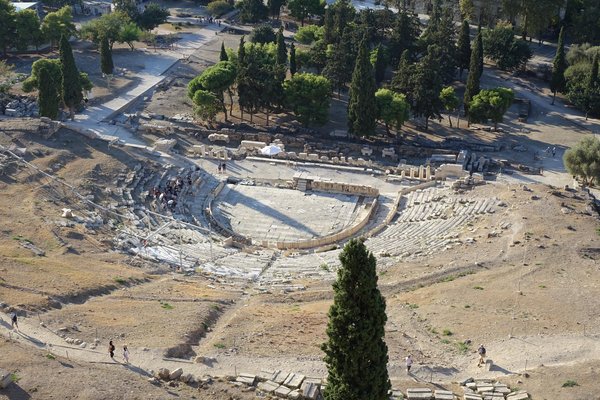Greece
Ancient Greek Theatres
Site Info
Official Information
- Full Name
- Ancient Greek Theatres (ID: 5869)
- Country
- Greece
- Status
-
On tentative list 2014
Site history
History of Ancient Greek Theatres
- 2014: Added to Tentative List
- Added to tentative list
- Type
- Cultural
- Criteria
Links
- UNESCO
- whc.unesco.org
All Links
UNESCO.org
- whc.unesco.org — whc.unesco.org
Community Information
- Community Category
- Archaeological site: Ancient Greece
Travel Information
Recent Connections
News
No news.
Recent Visitors
Visitors of Ancient Greek Theatres
- AC
- Adrian Turtschi
- Afshin Iranpour
- Alexander Lehmann
- Alexander Parsons
- Ali Zingstra
- ALS
- A. Mehmet Haksever
- Ammon Watkins
- Ana
- Andrew_Kerr
- Argo
- Artsybrea
- Astraftis
- basementonline
- BaziFettehenne
- bergecn
- bossc
- Bram de Bruin
- Bropyk
- brornt
- butterflybird
- Can SARICA
- CeeCeeSR
- Chinmaya
- Christine
- christof
- Christoph
- Christravelblog
- Clyde
- Daniel Chazad
- Daniel Gabi
- Dan Pettigrew
- David Aaronson
- David Berlanda
- debatecoach
- Deffra
- Dennis Nicklaus
- Dimitar Krastev
- DouglasR
- Els Slots
- erdsaumnaht
- Erik Jelinek
- Errol Neo
- Evgenii
- forest80
- Francky D'Hoop
- Frederik Dawson
- FS
- GabLabCebu
- George Gdanski
- GeorgeIng61
- Giannis75
- Hadrianus
- Hammeel
- HaraldOest
- Harry Mitsidis
- Hasco
- henrik_hannfors
- henryjiao18
- Hubert
- Hughes1920
- Ilya Burlak
- Ingrid
- James Bowyer
- Jarek Pokrzywnicki
- Jasonfd247
- Javier Coro
- Jay T
- Jesse S 2010
- Joebobs
- John Smaranda
- Jonas Kremer
- jonathanfr
- Juha Sjoeblom
- Kevin McFarland
- Kevin Padley-Knight
- Klara Woodson
- KngAlaric
- Krzysztof B
- Lisu Marian
- Lithobates
- Luboang
- Ludvan
- Maciej Gil
- MarcoB_0
- Martina Rúčková
- Mathijs
- MaxHeAnouBen
- MaYumin
- M. Huineman
- michaelsballard
- Michael Turtle
- MMM
- Monica Tasciotti
- MoPython
- nan
- nikolamus
- palka25
- Patrik_globe
- Paul Schofield
- peacemaker2142
- Philipp Peterer
- Pieter Dijkshoorn
- Pink Bunny
- Piotr Wasil
- Porcho
- pressdm
- Purrfect
- Rachel Perkins
- Rafał Kałczuga
- Randi Thomsen
- ReallyDeepThoughts
- Reiseblitz
- Reisedachs
- Riccardo Quaranta
- Rick Ohm
- RobRos
- Roger Ourset
- Rubbie
- Rudegirl
- Sclowitz
- Sergio Arjona
- Simonh
- sncjob
- Solivagant
- Squiffy
- Stan
- Stanislaw Warwas
- StaziG
- Svein Elias
- Szucs Tamas
- Tamara Ratz
- Tatiana Nikulnikova
- Thomas Buechler
- Thomas van der Walt
- Tim Allen
- tommasorossotti
- tony0001
- triath
- Truls Brekke
- Tsunami
- Twobaconsandaboston
- Vanessa Buechler
- Van Hung
- V&M
- voyager
- WILLIAM RICH
- Wojciech Fedoruk
- wrung24
- Yevhen Ivanovych
- Zach
- Zizmondka
- Zos M
Community Reviews
Show full reviews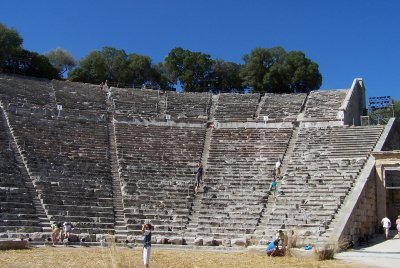
I don't envy the people who have to say which of the ancient Greek theatres deserve UNESCO listing because there are a lot and even some of the small ones I've been to are nonetheless impressive. For example, the huge theatre of Epidavros is famous and well known to most Greekophiles but there is also an absolutely charming and much smaller amphitheatre nearby called the Theatre of Palaia Epidavros. But I will stick to the script and mention a visit to the aforementioned huge theatre at Epidavros.And it is indeed, hugely impressive and is still used for concerts even today.There's also a very nice museum on site with some artifacts that wouldn't be out of place in the national museum in Athens.
Keep reading 0 comments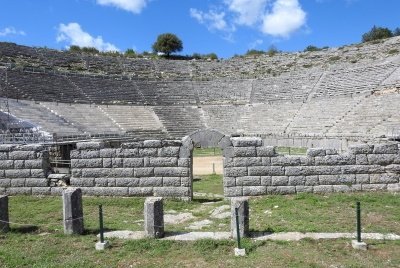
Dodoni (or Dodona, the Greek η does not translate well) is one of the 15 theaters included in the Ancient Greek Theatres TWHS. It even held a spot on its own on the Greek Tentative List between 1985 and 1996. I hadn’t singled it out as a destination on my Northern Greece itinerary, but when I had to return my rental car to Ioannina Airport anyway (only 30km away) I decided to have a look.
The site lies in a rural location, just off the main highway between Ioannina and Athens. There is ample free parking and the opening hours are 8-20. A ticket costs 8 EUR, and there are toilets and a little museum shop at the entrance. It is known as the ‘Dodoni Archaeological Site’, as its main historic relevance is that it was a sanctuary to Zeus. Within a walled enclosure lie the temples and a bouleuterion. Until the 5th century B.C., the cult rituals were executed by priestesses and priests under a sacred oak tree, where they “interpreted the rustling of the oak leaves to determine the correct actions to be taken”. Thousands of oracle tablets were found on its grounds with questions for the Oracle. Even Odysseus went there, as described by Homerus in Odyssey XIV!
The theatre dates from around 290 B.C. when King Pyrrhus (Ioannina’s airport is named after him, as well as the term Pyrrhic victory) started an ambitious building program to upgrade the sanctuary. It had a …
Keep reading 0 comments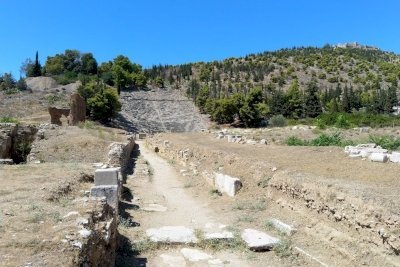
Greece is littered with Greek ruins: agoras, acropolis and amphitheatres. Places you have probably never heard of, e.g. Lindos on Rhodes, have amphitheatres that would make a medieval king proud. As such, I appreciate the huge tentative site as it guides your travel to lesser (and still great) antiquity sites to visit while you are in the area.
Excluding the already inscribed WHS (Delphi, Epidauros) and the buffer zone one (Athens), I have seen two amphitheatres in Greece: Argos and Lindos. Lindos was a day trip in Rhodes, Argos was on my way after visiting Mycene. These are nice sprinkles to a Greece trip. They come with an agora and in the case of Lindos with an acropolis, too. But are they WHS material?
OUV
If any of the proposed amphitheatres were in Germany, they would definitely have OUV. But for Greece and ruins from antiquity the requirements are substantially higher, a bit like Italy. Also, as I understand it (and from what I have seen on my travels), the best preserved amphitheatre (Epidauros) is already inscribed. As are the ones in Delos and Epidauros. And the Athens' one practically is, too, as you will visit it, when you are visiting the Akropolis.
I am not convinced that creating a serial site combining inscribed and further amphitheatres adds anything to the list. This should not keep you from visiting if you are in the area, though.
Getting There
For the inscribed sites, check their …
Keep reading 0 comments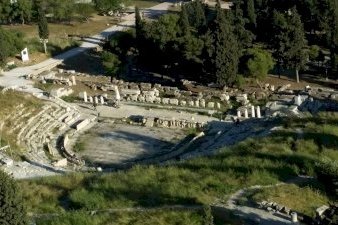
On my trip to Greece in 2014, I visited the Theatre of Dionysus in Athens and the Theatre of Delphi on tours of the Athenian Acropolis and the Sanctuary of Apollo in Delphi, respectively. The Theatre of Dionysus is quite small and not that impressive, but better preserved than the nearby larger Odeon. I only really viewed it from above, and it wasn't a very memorable sight. The theatre at Delphi seems larger and better preserved than the one in Athens. I also had a better view of it from the bottom.
As a whole, the Ancient Greek Theatres do have OUV, and they are definitely symbols of innovations in art, not to mention demonstrations of innovations in acoustics and architecture, but does that make them better grouped together? Theatres are essential parts of ancient Greek cities, and as stated in the justifications of OUV, are completely connected to other parts of the cities. That's the problem with this serial T-list site: the individual theatres are more coherent sites with their respective cities than with what seems to be a somewhat random selection of theatres around Greece. They were built at different times, under different conditions, tell different stories of different cities, and lie in various states of preservation. A serial site this big can't have every site considered revolutionary. We also shouldn't forget that other essential parts of an ancient Greek city exist, and theatres shouldn't be the only structures highlighted in every single ruin now. Theatres are …
Keep reading 0 comments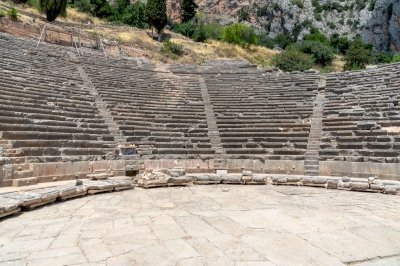
While touring Greece in the summer of 2018, I stopped by a number of its World Heritage sites, and had a chance to see theaters at Delos, Acropolis (called Dionysos Theater), and Delphi. Wherever a theater is part of an ancient site, it is always among the most grandiose monuments to the skill and mastery of the builders of the day. The one at Delos has been pretty much leveled by the two thousand years of neglect - the shape remains, but it is significantly ruined. Dionysos Theater is better preserved. So is the theater at Delphi, the smallest of the three that I've seen.
For all of the recognition that I am happy to grant to the master builders, I am ambivalent about this serial site standing on its own for future inscription. I don't think that theaters work as monuments of ancient civilizations outside of the context of the larger archaeological sites that they belong to. As part of the complex, a theater complements the rich picture of urban life along with other structures. You practically cannot ascribe any value to it without considering its relationship to the surrounding city, its proximity to the places of worship, places of commerce, living quarters of rich and poor. On their own, these theaters are basically relatively impressive feats of architecture that may or may not have survived the test of time all that well; the connection between them is no bigger than the fact that every city of note …
Keep reading 0 comments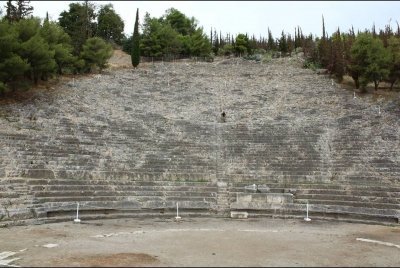
The “Ancient Greek Theatres” proposed site encompasses 15 theatres across Greece including three that are already World heritage sites (Epidaure, Delphi, Delos) and one, the Dionysos theatre, located on the slopes of the Acropolis, in the buffer zone.
The Greek theatres definitively possess an objective OUV for the world’s culture and history. It embodies the level of advancement reached by ancient Greece. Moreover, this serial site puts the light on several major ancient Greece sites but also on more remote ancient greek cities and ruins that help acquiring a broader view and understanding on Greek antiquity.
On top of those of Epidaure, Delphi and Athens, I have also visited the theatre of Argos which is quite impressive and surrounded by large ruins.
Keep reading 0 comments
